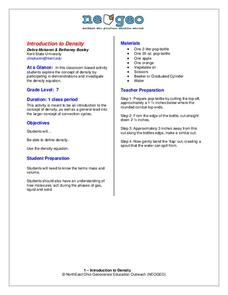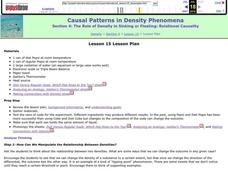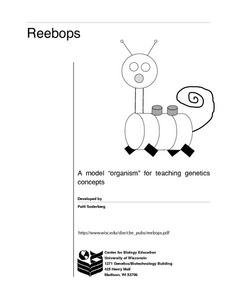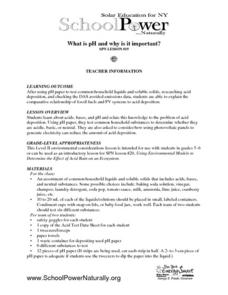Curated OER
Greenhouse Effect: Pop Bottle Experiment
Young scholars explore global warming by conducting a weather experiment. In this greenhouse gas lesson, students define the greenhouse effect and the impact on our ozone layer. Young scholars utilize a soda pop bottle, floodlight bulb,...
NASA
Pop Can Hero Engine
Hang a soda can from a string and watch it spin by the force created by water streaming out of slanted holes. This plan provides background information, detailed materials and procedures, discussion questions, a lab worksheet, and...
Curated OER
Acidity of Soda Pop
Students conduct an experiment to determine the acidity of three different brands of soda by adding a known volume of base until a pink color appears in the reaction vessel. They test fresh and flat soda, observe any differences, and...
American Chemical Society
Changing the Density of an Object - Adding Material
In this sixth of seven activities revolving around the concept of density, physical science fans figure out if anything can be done to change the density of an object. Demonstrate by placing a can of regular and a can of diet soda into a...
Curated OER
Physical Science Review 5th Grade
In this review of physical science worksheet, students use recall to answer multiple choice questions about electricity and chemical changes. Students answer 25 questions.
Curated OER
Coke, Soda, Hot VS. Cold
First graders explore chemical reactions in hot bottled soda and cold bottled soda. In this lesson about chemical reactions, 1st graders observe an experiment and discuss the results as a class. Students determine why bubbles are...
Curated OER
Fizzy Pop
Fifth graders compare and identify variables that affect the rate of a chemical change using Alka-Seltzer, water, ice, and hot water. They time how long each variable takes to pop the canister into the air, and record the results on a...
Curated OER
Activity #18 Decompostion of Baking Soda
Middle schoolers observe what occurs as baking soda is heated. They explain why a chemical rather than a physical change occurred during the procedure. Pupils identify the tpe of reaction (decomposition). Students conduct a glowing...
Curated OER
Soda Pop Can Hero Engine
Students view a demonstration on Newton's Laws of Motion using a soda can. In this Newton's law activity students discuss what they learned from the demonstration.
Curated OER
Create a Cloud in a Bottle
Meteorology or earth science classes reach for the sky with this lesson plan! You will need to purchase a Fizz Keeper® device and temperature strip for each lab group if you want them to perform this as an activity rather than you doing...
Curated OER
Strong Ice
Through three activities, first-time physical scientists wonder at the properties of water. Freeze some soda cans and a container of water prior to the investigation to show that water expands when frozen. Lab groups experiement with...
NorthEast Ohio Geoscience Education Outreach
Introduction to Density
Seventh grade scientists weigh in on the concept of density. In a nutshell, they participate in the following activities:
Measurement of the mass and volume of fruit in order to compare densities
Measurement of the mass of oil and water...
Texas State Energy Conservation Office
Investigation: Insulation
Youngsters compare the heat-holding abilities of three different cans by insulating two with different materials and measuring the temperature change of hot water over a 20-minute period.
Michigan State University
Gases Matter
Young scientists learn that seeing isn't necessarily believing when it comes to the states of matter. After performing a fun class demonstration that models the difference between solids, liquids, and gases, children complete a series of...
Curated OER
Characteristics of Matter
Students study matter. In this science lesson plan, students examine the relationships among gravity, weight, and mass, the metric measurement of distance and volume, and density and its application to physical properties.
Curated OER
What A Gas!
Students study various aspects of air. In this science lesson plan, students discover that air occupies space, understand the visual effects of air, and explain how air exerts force.
Curated OER
pH Basics
At some point, all science learners experiment with pH. In this brief lesson, they simply use pH strips or a meter to find the pH of six different solutions. A useful worksheet that displays a data chart is included for your students.
Curated OER
The Role of Density in Sinking or Floating: Relational Causality
Students watch the teacher do a demonstration of density with diet and regular soda. Note: try this first, as different types of artificial sweetener have different densities. Students discuss density and volume. They discuss "Relational...
Curated OER
States of Matter For Grades Kg-8
Students conduct studies of states of matter. In this science lesson plan, students observe the properties of matter and classify different substances as solids, liquids, and gases.
Curated OER
The Vibrational Nature of Sound
Students explore the vibrational nature of sound. In this science lesson plan, students gain an understanding of sound frequency, pitch, and conduction using the string telephone, tuning fork and musical glasses experiments.
Curated OER
Reebops a Model "Organism" for Teaching Genetics Concepts
Reebops are cute, marshmallow-based creatures that can be used to teach inheritance. Beginning biologists draw strips of paper that represent chromosomes from two envelopes, one for the father, and one for the mother. Each parent...
Curated OER
What is pH and Why is It Important?
Students investigate about acids, bases, and pH and relate this information to the problem of acid deposition. They use pH paper, students test common household substances to determine whether they are acidic, basic, or neutral. Pupils...
Foundation for Water & Energy Education
How is Flowing Water an Energy Source? Activity C
Can the force of falling water through a tube vary by altering the diameter of the tube or its height? That is what physical scientists aim to discover in this activity, the third in successively more revealing activities on the power of...
NOAA
The Incredible Carbon Journey: Play the Carbon Journey Game
Class members explore the carbon cycle in the final installment of the 10-part Discover Your Changing World series. They play a simulation game where they walk through the steps carbon takes as it cycles through the different layers...

























